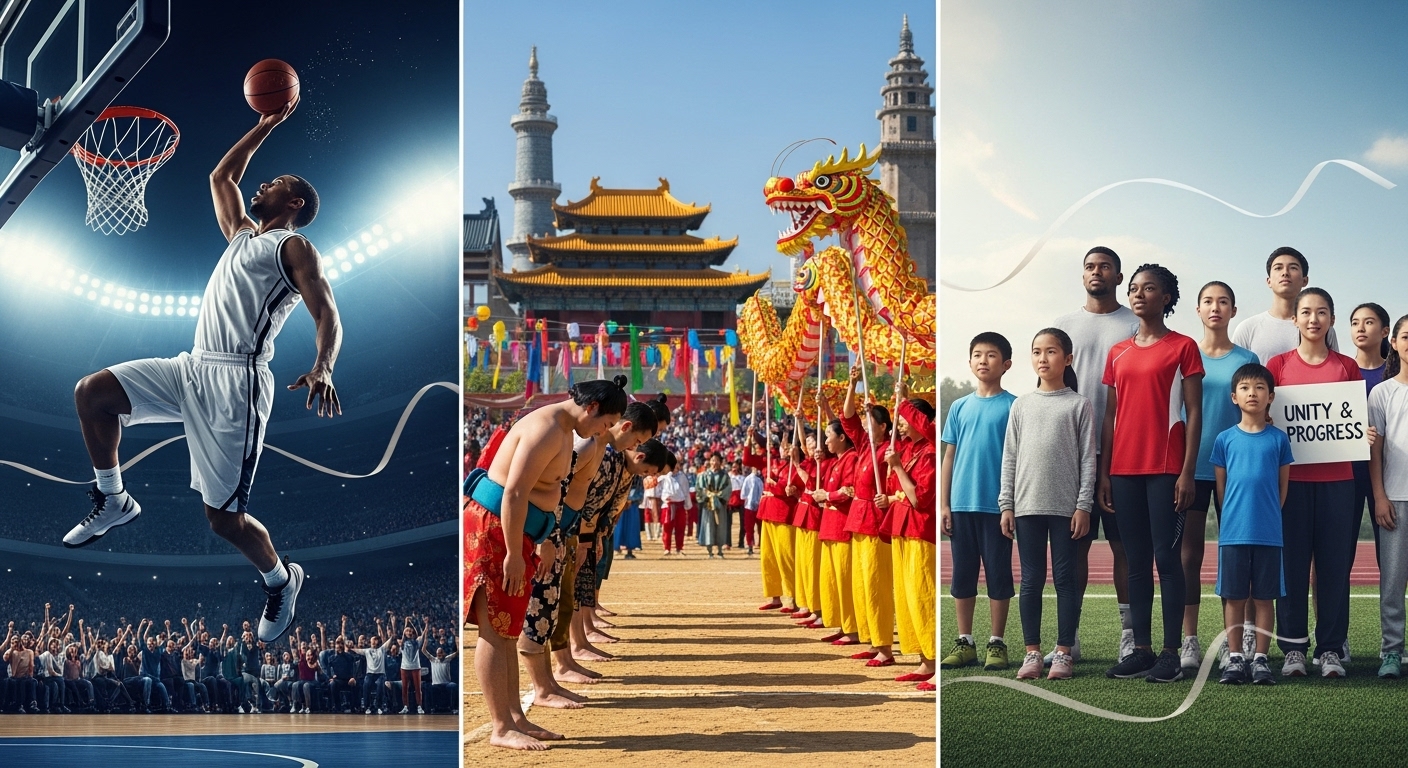Sports have been an inseparable part of human civilization since the dawn of time. Whether in ancient Greece with the Olympic Games or in modern cities hosting global tournaments, the world of sports has always captured hearts, united nations, and inspired individuals to strive for greatness. It is not merely about competition; it is a celebration of discipline, endurance, teamwork, and the sheer joy of pushing human limits.
From football to athletics, from cricket to basketball, from swimming to martial arts — every sport tells a story. A story of struggle, perseverance, and triumph that goes far beyond medals or trophies. In this blog, we explore the significance, evolution, diversity, and emotional power of sports that continue to shape societies across the globe.
The Origins of Sports in Human Culture
The history of sports traces back thousands of years, long before organized tournaments or modern rules. In prehistoric societies, physical activities often revolved around survival — hunting, running, and throwing were vital skills. Gradually, these survival skills transformed into forms of entertainment and competition.
In ancient Egypt, wrestling and archery were common sports. The Greeks formalized athletic contests into what became the Olympic Games, emphasizing the harmony of mind and body. The Romans, on the other hand, turned physical contests into grand spectacles in their arenas. Across Asia, martial arts emerged not only as self-defense but as spiritual and philosophical practices.
Sports were not just physical; they were deeply tied to social and cultural identity. They represented strength, honor, and unity, often becoming rituals to celebrate gods, kings, or victories in battle. This deep cultural root is why sports continue to evoke emotion and pride even today.
The Global Evolution of Modern Sports
As societies advanced, so did sports. The 19th and 20th centuries saw the birth of modern organized sports, with the establishment of clubs, associations, and governing bodies. Football (soccer) became the world’s most popular sport, spreading from Europe to every corner of the planet. Cricket grew as a legacy of colonial history, while basketball and baseball became symbols of American culture.
The reintroduction of the Olympic Games in 1896 marked a turning point. It gave athletes a global platform and turned sports into a universal language. Over the years, global tournaments like the FIFA World Cup, the NBA, the Wimbledon Championships, and the ICC Cricket World Cup have become grand celebrations watched by billions.
With industrialization and globalization, sports turned into professions. Athletes became heroes, and their stories of victory and defeat began to inspire millions. The rise of mass media further amplified their influence, turning games into global events that transcend cultural boundaries.
The Physical and Mental Benefits of Sports
Beyond entertainment, sports play a crucial role in improving health and well-being. Physical activity strengthens the body, enhances cardiovascular performance, and improves flexibility, stamina, and coordination. Regular involvement in sports reduces the risk of chronic diseases such as diabetes, heart disease, and obesity.
However, the benefits are not just physical. Sports have a profound impact on mental health. They boost mood, reduce stress, and build confidence. Team sports, in particular, teach communication, empathy, and collaboration — essential skills in both personal and professional life.
The sense of accomplishment after mastering a skill or achieving a goal can be transformative. It fosters resilience and helps individuals handle challenges with a positive mindset. Sports psychology has grown into a vital discipline, helping athletes and enthusiasts harness focus, motivation, and emotional control.
Sports and the Spirit of Competition
At the heart of every sport lies competition — the drive to test oneself against others. But competition is not about rivalry alone; it is about improvement. It teaches humility in defeat and grace in victory.
True athletes understand that the opponent is not an enemy but a mirror that reflects one’s own strengths and weaknesses. Through competition, individuals learn perseverance, patience, and the importance of preparation. It pushes them to evolve, both physically and mentally.
The beauty of sports is that every competition, whether on a local field or an international arena, becomes a story of effort and spirit. The crowd’s cheers, the moments of silence before a decisive move, and the eruption of joy after a win — all combine to create timeless memories.
The Role of Sports in Society
Sports have a social dimension that few other activities can match. They unite communities, transcend political boundaries, and serve as a universal language of peace. During global tournaments, nations pause their differences to cheer for their heroes.
At a local level, sports bring people together. Schools and clubs foster inclusion, teaching children the values of teamwork, respect, and fairness. For marginalized communities, sports can offer hope and opportunity. Programs around the world use sports to fight poverty, empower youth, and promote gender equality.
Sporting events also play a major role in the economy. They create jobs, attract tourism, and stimulate industries from media to merchandising. Cities that host major tournaments often experience a surge in infrastructure development, cultural exchange, and global recognition.
Technology and the Transformation of Sports
Modern technology has revolutionized every aspect of sports. Advanced analytics, wearable sensors, and artificial intelligence now track performance with incredible precision. Coaches use data to design strategies, prevent injuries, and optimize training.
Instant replays and video assistant referee (VAR) systems ensure fair play. In sports medicine, innovations in rehabilitation and nutrition extend athletes’ careers. The rise of social media has brought fans closer to their favorite players, allowing direct interaction and engagement.
Even the way we consume sports has changed. Virtual reality experiences, online streaming, and gaming platforms have created new ways to participate and enjoy. The line between physical and digital sports is blurring, with esports emerging as a billion-dollar industry that rivals traditional competitions in popularity.
Women in Sports: Breaking Barriers and Making History
For centuries, women were excluded from organized sports. Yet, their passion and perseverance could not be contained. Today, female athletes are rewriting history, proving that talent knows no gender.
From Serena Williams dominating tennis courts to Simone Biles redefining gymnastics, women have shown excellence in every field. The rise of women’s football, cricket, and athletics has inspired a new generation of young girls to dream without limits.
Despite facing challenges such as unequal pay, lack of sponsorship, and limited media coverage, the progress is undeniable. The inclusion of more women in leadership roles, coaching, and sports administration marks a new era of equality and representation.
Youth and the Future of Sports
The youth are the heartbeat of sports. Their energy, curiosity, and ambition drive innovation and excitement. Schools and academies around the world play a vital role in identifying and nurturing talent from an early age.
Sports teach young people the importance of discipline, respect, and goal-setting. They also offer a positive outlet for emotions and reduce the risk of negative social behaviors. Many young athletes dream of representing their country, but even those who do not reach professional levels gain lifelong lessons from their sporting experiences.
The digital age has also created new opportunities for youth participation. Online coaching, fitness apps, and interactive communities allow aspiring athletes to train and learn from global experts. The accessibility of information and resources ensures that passion can thrive anywhere, regardless of background.
The Emotional Connection Between Fans and Sports
The bond between fans and sports is one of the most powerful human connections. For many, supporting a team or athlete becomes part of their identity. Victories bring joy and pride, while defeats bring tears and heartbreak — yet the loyalty never fades.
Sports fandom creates a sense of belonging. It connects people across generations and cultures, giving them a shared purpose. The chants in stadiums, the waving of flags, and the sea of colors represent unity in diversity.
Even in the digital world, fan communities thrive. Social media has made it easier than ever to share emotions, discuss performances, and celebrate milestones. Whether in the stands or online, the passion of fans continues to be the soul of every sport.
Sportsmanship: The True Essence of the Game
Beyond records and awards, sportsmanship defines the spirit of sports. It is about respect — for rules, opponents, and oneself. Great athletes are remembered not just for their victories but for their character.
When players help an injured rival, admit mistakes, or show humility in success, they remind the world of what sports truly stand for. Fair play, honesty, and respect transform competition into a celebration of humanity.
Sportsmanship also teaches the value of teamwork. Every player, no matter how skilled, depends on others — teammates, coaches, and even fans. It is this collective spirit that turns a game into a shared journey.
The Economic and Cultural Impact of Sports
Sports are not just about physical activity; they are a massive global industry. From broadcasting rights to sponsorships, merchandise to ticket sales, sports generate billions every year. Major events like the Olympics or World Cup can transform economies, attract global attention, and boost national morale.
Culturally, sports influence fashion, language, and lifestyle. Phrases from the field enter everyday conversations, and athletes become icons representing perseverance and success. Sports movies, literature, and documentaries further extend their influence into entertainment and education.
Moreover, international sporting events promote tourism and cultural exchange. Fans travel across continents to witness matches, explore new places, and interact with people of different backgrounds. This exchange fosters understanding and unity among diverse populations.
Challenges in the Modern Sports World
Despite its glory, the world of sports faces challenges. Issues like corruption, doping, racism, and commercialization sometimes overshadow the spirit of fair competition. The pressure to win at all costs can lead to unethical behavior and mental strain among athletes.
The commercialization of sports has also raised questions about authenticity. While sponsorships and endorsements fuel growth, they sometimes shift focus from the game to the business side. Balancing profitability with integrity remains a crucial concern for sports organizations.
Mental health awareness among athletes is another growing topic. The pressure of public scrutiny, constant competition, and expectations can take a toll on emotional well-being. Thankfully, the conversation around mental health is becoming more open, with many athletes advocating for psychological support and balance.
Sports and Global Peace
Few things unite people as powerfully as sports. During times of political tension or social division, sports act as a bridge. International events often bring together countries that might otherwise remain distant.
Sports diplomacy has been used to improve relations between nations and foster dialogue. Shared participation in tournaments promotes understanding, tolerance, and mutual respect. It shows that humanity can rise above differences and celebrate common values through games.
Sports for peace initiatives around the world use games to empower refugees, heal war-torn communities, and promote equality. The message is clear — where words fail, sports can speak.
The Timeless Legacy of Sports
Sports are far more than games; they are reflections of human potential. They embody courage, creativity, and resilience. Every athlete’s story — from local fields to global arenas — adds a chapter to the collective human narrative of striving and overcoming.
As technology, society, and culture evolve, sports will continue to adapt. But their essence — the thrill of movement, the joy of play, and the pursuit of excellence — will remain timeless. Whether watched from a crowded stadium or a quiet home, sports will always inspire the same passion that has driven humanity for millennia.
Conclusion
The world of sports is a living testament to human spirit. It teaches lessons that transcend generations — about teamwork, respect, discipline, and perseverance. It binds nations, heals divides, and uplifts souls.
From ancient arenas to digital platforms, the essence of sports has remained unchanged: it is about pushing limits, embracing challenges, and celebrating life. Whether you are an athlete, a fan, or an observer, the influence of sports is undeniable. It shapes character, strengthens communities, and reminds us all that victory is not just about winning — it is about giving your best, every time.



